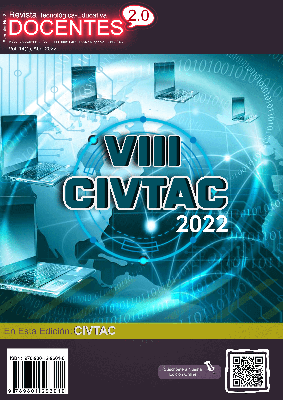Innovation of Management Strategies in the Pre-profesisonal Practical Process
 DOI:
https://doi.org/10.37843/rted.v14i1.292
DOI:
https://doi.org/10.37843/rted.v14i1.292
Main Article Content
Abstract
Pre-professional internships are considered the continuity of the contact that students make with the work context. It is a meeting where development is favored, and the necessary skills to face the real problems of the professional field are consolidated. The objective of the present investigation was to improve the management strategies in the pre-professional practical process of the San Francisco de Asís Private University, El Alto Branch. The present study was contemplated under the sequential exploratory method, paradigm of pragmatism, hybrid approach, exploratory-descriptive type, and non-experimental design. It was developed with a non-probabilistic sample of the intentional kind, with inclusion criteria of 24 students and five teachers. The technique of recording the observation of pre-professional reports, vice-chancellor's office, and focus group were used. The quantitative data analysis was carried out through the arithmetic mean, based on obtaining averages and qualitative information based on focus groups and documentary reviews. Finally, the study allowed to have a detailed plan linking, the university with institutions related to each career of the academic offer of the USFA university. Also, the work is entitled to generate new inter-institutional relationships, increasing the options of spaces where students can develop their pre-professional practices.
Downloads
Metrics
Article Details

This work is licensed under a Creative Commons Attribution-NonCommercial-NoDerivatives 4.0 International License.
Those authors who have publications in our journal accept the following terms:
- When a work is accepted for publication, the author retains rights of reproduction, distribution of his/her article for exploitation in all countries of the world in the format provided by our magazine and any other magnetic medium, optical, and digital.
- Authors will retain their copyright and guarantee the journal the right first to publish their work, which will be simultaneously subject to the Creative Commons Acknowledgment License (Attribution-NonCommercial-NoDerivatives 4.0 International (CC BY-NC-ND 4.0)). That allows third parties to copy and redistribute the material in any medium or format, under the following conditions: Acknowledgment - You must properly acknowledge authorship, provide a link to the license, and indicate if any changes have been made. You may do so in any reasonable way, but not in a way that suggests you have the licensor's endorsement or receive it for your use. NonCommercial - You may not use the material for a commercial purpose. NoDerivatives - If you remix, transform, or build from the material, you cannot broadcast the modified material. There are no additional restrictions - You cannot apply legal terms or technological measures that legally restrict you from doing what the license allows.
- Authors may adopt other non-exclusive license agreements to distribute the published version of the work (e.g., deposit it in an institutional archive or publish it in a monographic volume) provided that the initial publication in this journal is indicated.
- Authors are allowed and recommended to disseminate their work through the Internet (e.g., in institutional telematic archives, repositories, libraries, or their website), producing exciting exchanges and increasing the published work's citations.
- Request of withdrawal an article has to be done in writing by the author to the Editor, becoming effective after a written response from the Editor. For this purpose, the author or authors will send correspondence via e-mail: [email protected].
- The author will not receive financial compensation for the publication of his work.
- All Docentes 2.0 Journal publications are under the Open Journal System (OJS) platform at: https://ojs.docentes20.com/.
References
Armengol-Asparó, C., Del Arco-Bravo, I., Gairín-Sallán, J., Muñoz-Moreno, J. L. & Rodríguez-Gómez, D. (2019). Prácticas curriculares en la formación universitaria de los futuros profesionales: modelo para la actuación. Revista Prácticum, 4(1), 19-36. DOI: https://doi.org/10.24310/RevPracticumrep.v4i1.9873
Centeno-Caamal, R. (2021). Formación Tecnológica y Competencias Digitales Docentes. Revista Tecnológica-Educativa Docentes 2.0, 11(1), 174-182. https://doi.org/10.37843/rted.v11i1.210 DOI: https://doi.org/10.37843/rted.v11i1.210
De Miguel, M. (2005). Modalidades de enseñanza centradas en el desarrollo de competencias: orientaciones para promover el cambio metodológico en el espacio europeo de educación superior. Universidad de Oviedo.
Escobar-Callejas, P. H. (2019). Epistemología, paradigmas y métodos de investigación: en facilito. ITM.
Gantier-Aliaga, S. (2021). Estrategias de Evaluación de Competencias en el Rendimiento Académico de Estudiantes Universitarios de Psicología. Revista Tecnológica-Educativa Docentes 2.0, 11(1), 5-10. https://doi.org/10.37843/rted.v11i1.141 DOI: https://doi.org/10.37843/rted.v11i1.141
Giroux, H. A. (1990). Los profesores como intelectuales. Hacia una pedagogía crítica del aprendizaje. Piados.
Gómez-Labrada, A.R. & León-Aguirre, C. (2016). Universidad Comunidad. Escenario académico para aprender haciendo. Universidad Nacional de Loja.
Hernández-Sampieri, R. & Mendoza, C. (2018). Metodología de la investigación. Las rutas cuantitativa, cualitativa y mixta. Editorial McGrawHill Education.
Larrea de Granados, E. (2015). Proyecto de prácticas preprofesionales. http://www.ces.gob.ec/index.php?option=com_phocadownload&view=category&id=189&Itemid=545.
Mejia-Tellez, C. & Mejia-Ibáñez, R. (2017). Metodología de la Investigación: Cómo realizar y presentar trabajos de investigación. Murillo.
Ortiz-Riaga, M. C. & Morales-Rubiano, M. E. (2011). La extensión universitaria en América Latina: concepciones y tendencias. Educación y Educadores, 14 (2), 349-366. https://www.redalyc.org/pdf/834/83421404008.pdf DOI: https://doi.org/10.5294/edu.2011.14.2.6
Rama-Vitale, C. (2011). La incorporación de la práctica estudiantil en las universidades latinoamericanas como nuevo paradigma educativo. Universidades, (48), 33-45. http://www.redalyc.org/articulo.oa?id=37319199006
Universidad Privada San Francisco de Asís (2016). Carrera de Psicología. https://www.usfa.edu.bo/psicologia/
Universidad Privada San Francisco de Asís. (2015). Informe anual de la Gestión Académica 2015 de Vicerrectorado – Subsede Académica El Alto de la Universidad Privada San Francisco de Asís (Informe N° 002).
Zabalza, M. A. (1998). El Prácticum en la formación de los maestros. En Rodríguez, A. Marcos, E., Sanz-Lobo & Mª V. Sotomayor-Sáez (Coord.). La formación de los maestros en los países de la Unión Europea. 169-202. Narcea.
Zambrano, R., J., Loachamín-Marcillo, M., Pilco-Gallegos, M., & Pilco-Gallegos, W. J. (2019). Cuestionario para medir la importancia y satisfacción de los servicios universitarios desde la perspectiva estudiantil. Ciencia UNEMI, 12(30), 35-45. https://doi.org/10.29076/issn.2528-7737vol12iss30.201935-45p DOI: https://doi.org/10.29076/issn.2528-7737vol12iss30.2019pp35-45p






